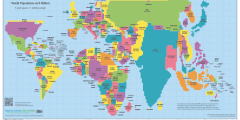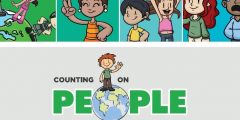Early Childhood (K – 2)
Our primary grades activities are all interdisciplinary. They foster environmental awareness among young students while building skills in literacy, number sense, science, and geography. Presented topics include interdependence in nature, understanding human needs and wants (food, energy, water and shelter), resource and land use, and the importance of environmental stewardship and conservation.
Upper Elementary (3 – 5)
Our activities for upper elementary grades are also interdisciplinary. They introduce students to concepts of human population change (density, crowding, birth/death rates), carrying capacity, and human changes to our environment, such as land use patterns (agriculture, forests, human settlements) and pollution. Presented activities promote global citizenship and students’ interest in environmental issues while also building skill sets in scientific inquiry, data analysis, and critical thinking.
Middle Grades (6 – 8)
Workshops for middle level professionals can be either interdisciplinary or subject specific in the areas of life science, social studies, or mathematics. Topics addressed in life sciences and social studies workshops include understanding population growth trends through history, human-environmental interactions and their impacts on different ecosystems, renewable and nonrenewable resource consumption, ecological footprints, carrying capacity, resource distribution and scarcity, biodiversity, the role of gender in education worldwide, wealth distribution, and quality of life indicators. The presented activities encourage critical thinking and group problem solving, and making connections across the curriculum.
We also have a set of activities that are appropriate for science/math integration and can customize an agenda that uses the environmental themes mentioned above while building middle school math skills, especially in the areas of measurement, data analysis, probability, problem solving, and representation. Our math curriculum demonstrates effective ways to bring real-world data into the classroom so students can see the relevance of mathematics to their daily lives and for understanding the world around them.
High School (9 – 12)
Our high school level activities are appropriate for a number of courses including Biology, Environmental Science (Honors, AP, IB), World History, Economics, World Geography, AP Human Geography, and Global Issues. We customize workshop agendas for specific courses. In addition to the topics covered in the middle grades, our high school level workshops include more depth on specific issues and include current information on global trends and national/international policies. Presented activities may address some of these topics: the demographic transition and demographic differences worldwide, poverty and wealth distribution, global public health trends, community/societal decision making, family planning programs worldwide, climate change, gender equity, social justice, and human impacts on specific ecosystems.






